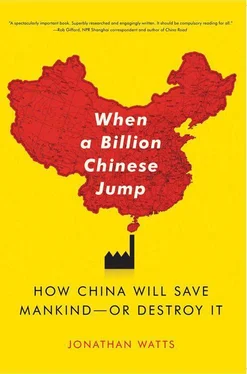Villagers put much of the blame on the colorful local businessman who wooed Deng’s daughter into backing the project. Dai Xiaolong’s gift of gab and willingness to take risks were remarkable even in a nation that had come to venerate its entrepreneurs. A former soldier and newspaper employee in the local industrial city of Benxi, he headed north to Heilongjing to make his fortune. After several years he came back with a small amount of seed capital and a head full of big ideas. He persuaded Huangbaiyu’s villagers to give him land and money to start a soy-sauce and pickled-cabbage factory. The business soon collapsed, but Dai was undaunted. He convinced the local school to use its tax-free status to set up a distillery. Tianyuan baijiu was a hit, but the success was not enough for Dai, who was in a hurry to get rich. He opened more than a dozen distilleries, then expanded into slaughterhouses, fish farms, and tourist resorts.
“It was great for a while,” recalled Mu Baozhi, a teacher at the school. “Villagers who invested 50,000 yuan in Dai’s enterprise were getting returns of 9,000 yuan per year. But it wasn’t well managed. In the end, it all went bust. Dai ended up owing over a hundred million to his investors.”
Mu kindly invited us into his old-style cottage for a hearty lunch of fish, rice, and mountain vegetables. The only insulation was a sheet of plastic taped over the window and a green quilt that covered the door, but the home was far cozier than the empty eco-residences. The old teacher, a Manchu, had lost money investing in Dai’s firms, but he still held the entrepreneur in high regard as a big thinker who genuinely wanted to embrace environmental sustainability, albeit as part of a wider strategy to build a personal empire.
“The sustainable eco-project was part of Dai’s plan to take control of the whole village,” Mu explained. “He wanted everyone to work for him. To do that, he had to provide housing and jobs for everyone. That’s where the eco-homes came in. But he failed to attract factories, so there was no employment incentive for people to leave their farmland.”
After lunch, we trudged back through the snow to the eco-village. But our talk with the second resident was interrupted. A member of the management team suddenly turned up and insisted we accompany him to the office. Having previously insisted they were unavailable, local officials now wanted to put in their side of the story.
The project coordinator, Xie Baoxing, met us in a room dominated by a large scale model of the eco-village encased in glass. We sat on opposite sides and, at first, I felt we were on opposite wavelengths as he extolled the energy-saving benefits of the project while I recalled the reality of stacks of firewood, empty homes, and unhappy tenants.
“How can it work if the people who live there don’t like it?” I asked.
“They are unhappy because their homes burned down. We gave them an alternative place to live. They don’t like it. But we can fix the problems. If you come back next year, it will be completely different.”
“But it hasn’t gone as planned at all, has it?”
“We can’t say we are a model. This is an experiment. We are moving ahead through trial and error.”
“Do you regret starting this project?”
“No, our country is committed to sustainable development. All business has a degree of risk. The problems here are not so big. We can overcome them.”
I sympathized. Xie was not to blame, and he was right that there were bound to be hiccups in the search for a sustainable future. But I departed Huangbaiyu unconvinced that it would ever succeed. If the community was a model of anything, it was how not to construct an eco-village: Dongtan on a smaller scale.
We drove back to the nearest city, Benxi, to track down Dai, but he was busy reinventing himself once again and was nowhere to be found. Having failed to make a fortune with an eco-village, he was now reportedly moving into mining. Nobody considered this a conflict of ideals. It was simple pragmatic materialism, the spirit of the age. Dai was not alone in dreaming up new schemes to be rich in Benxi. The city was another dot on the map where more than a million people were crowding to get ahead. Failing eco-cities were the least of the region’s problems.
At the bus station, I was surprised by the unusually tight security. Police were checking every passenger’s ID, something I had previously seen only in Xinjiang after a murderous attack on soldiers.
I asked the reason.
“This is China. All sorts of things happen here,” a bus conductor replied with considered vagueness.
“Like what?”
“Terrorism.”
“By whom?” I hadn’t heard of any separatist or religious extremists in this part of China before.
It took five minutes to get an answer. I was told the checks had started the previous year for fear of reprisals from “terrorist” investors who had lost a fortune in a bizarre 33-million-yuan ant-farming pyramid-selling scheme. Many staked their life savings on boxes of ants that they were promised would guarantee them rich returns from the traditional medicine industry. When the scam inevitably collapsed, 36,000 people lost their investment. Some were plunged into bankruptcy. Many protested. Others attempted to travel to Beijing to petition the central government. One committed suicide. 32The businessman behind the scheme, Wang Zhendong, was sentenced to death, but this harsh penalty failed to placate the enraged investors. The ant farmers are now considered the biggest security threat in Benxi. Salvador Dalí could not have painted a more surreal picture of China’s business landscape.
A brighter, more orderly canvas was on display at the final stop on my journey through the former rust belt. Dalian has arguably taken a bigger technological leap than any other city to clean up its environment. Home to 6 million people, this giant port has won accolades and investment over the past ten years as a result of cleaning up its air and opening up its development zones to green energy labs and high-tech companies. I was told that if any existing Chinese megalopolis could claim to be an eco-city, it was Dalian.
I woke up on my first morning in the city to that rarest of treats in urban China: clear skies. Against a sharp blue background, the red national flags fluttering atop government buildings seemed to blaze with pride. Clean, modern, and open, this was smart China at its best. While Shanghai was plagued by an overemphasis on fashion, Guangzhou by money, and Beijing by power, Dalian was blessed by moderate amounts of all three, along with sea breezes that helped to blow away what little pollution was emitted by the high-tech industries that concentrated here. This city boasted the cleanest urban air in China, with all but a few days of the year meeting the national “blue sky” standard. 33
The transformation was remarkable. Twenty years earlier, Dalian had been a center for heavy industry with air as foul as the rest of the rust belt. But the collapse of the old state-owned industries in the nineties proved a blessing. The former mayor, Bo Xilai, put parks and lawns on the sites of many dismantled factories (earning the nickname “Grass Bo” in the process), upgraded the city’s power plants, relocated the remaining heavy industry outside the city center, and invested heavily in wastewater treatment and public transport, which is now used for 45 percent of journeys—the highest level in China. In the process, Dalian reinvented itself as a clean, modern base for software and informational technology companies from Japan, South Korea, Taiwan, and Hong Kong. Bo, the son of Communist Party “immortal” Bo Yibo, was rewarded with promotion to the post of Liaoning governor, and the city was chosen to host the summer Davos conference. 34Average incomes in Dalian are high and living standards are considered to be among the best in China. 35
Читать дальше










